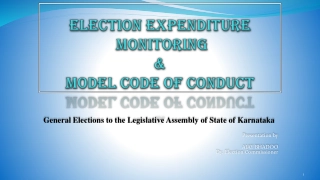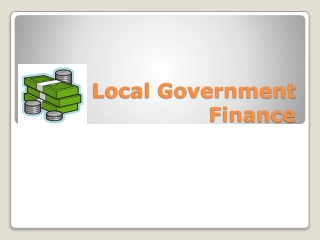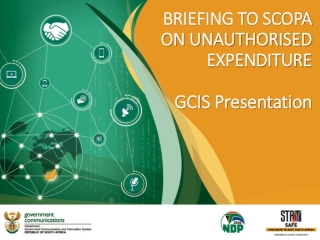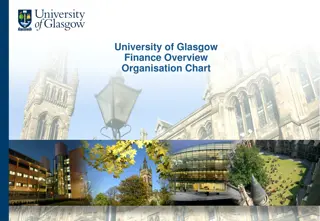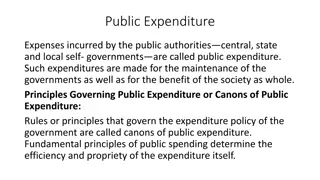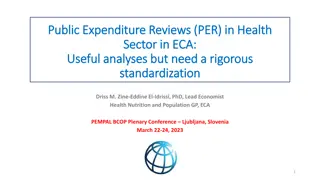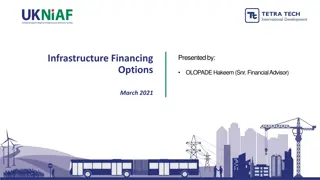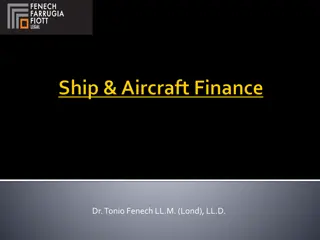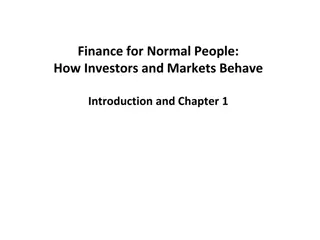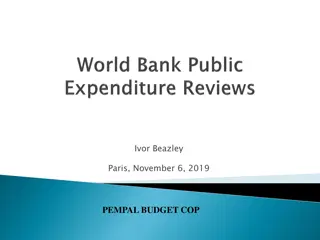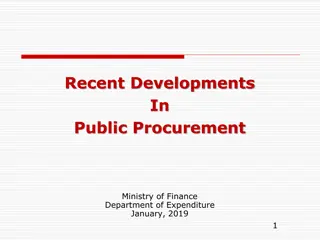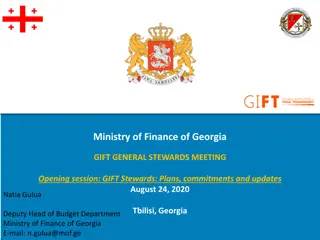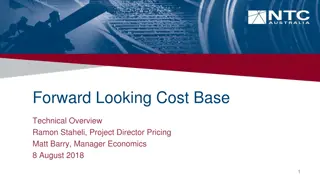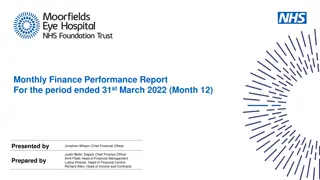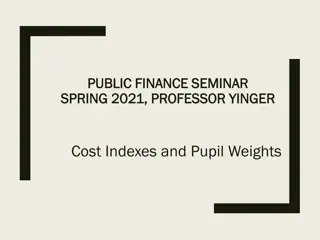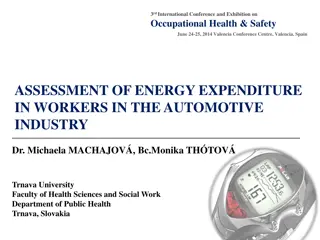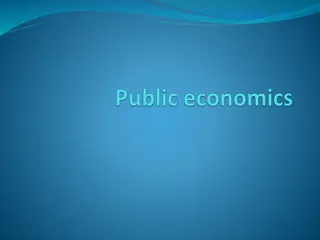Understanding Unauthorised Expenditure in Public Finance Management
The presentation by Dr. Mampho Modise delves into the concept of unauthorised expenditure in public finance management as defined by the Public Finance Management Act of 1999. It explains the implications of overspending on votes or main divisions and provides insights into how unauthorised expenditure can be financed. Recommendations for financing unauthorised expenditure in various government departments are also discussed, shedding light on specific cases such as in the Department of Cooperative Governance and Government Communication. Additionally, a case study from the COGTA department in 2006/07 showcases the challenges and mitigating actions taken to address unauthorised expenditure.
Download Presentation

Please find below an Image/Link to download the presentation.
The content on the website is provided AS IS for your information and personal use only. It may not be sold, licensed, or shared on other websites without obtaining consent from the author. Download presentation by click this link. If you encounter any issues during the download, it is possible that the publisher has removed the file from their server.
E N D
Presentation Transcript
PRESENTED BY: Dr Mampho Modise UNAUTHORISED EXPENDITURE PUBLIC FINANCE June 2023
2 DEFINITION Section 1 Public Finance Management Act, 1999 (PFMA) Unauthorisedexpenditure means (a)overspending of a vote or a main division within a vote; (b)expenditure not in accordance with the purpose of a vote or, in the case of a main division, not in accordance with the purpose of the main division
3 FINANCING OF UNAUTHORISED EXPENDITURE Section 34 Public Finance Management Act, 1999 (PFMA) (1) Unauthorised expenditure does not become a charge against a Revenue Fund except when (a) the expenditure is an overspending of a vote and Parliament or a provincial legislature, as may be appropriate, approves, as a direct charge against the relevant Revenue Fund, an additional amount for that vote which covers the overspending; or (b) the expenditure is unauthorised for another reason and Parliament or a provincial legislature, as may be appropriate, authorises the expenditure as a direct charge against the relevant Revenue Fund. (2) If Parliament or a provincial legislature does not approve in terms of subsection (1) (a) an additional amount for the amount of any overspending, that amount becomes a charge against the funds allocated for the next or future financial years under the relevant vote.
4 UNAUTHORISED EXPENDITURE Recommendations on the financing of the unauthorised expenditure for the following departments have been made: Vote 3: Department of Cooperative Governance Vote 4: Government Communication and Information System Vote 11: Department of Public Service and Administration Vote 14: Statistics South Africa Vote 16: Department of Basic Education Vote 19: Department of Social Development Vote 20: Department of Women, Youth and Persons with Disabilities Vote 22: Department of Correctional Services Vote 24: Independent Police Investigative Directorate Vote 30: Department of Telecommunications and Digital Technologies Vote 34: Department of Minerals and Energy Vote 40: Department of Transport Vote 41: Department of Water and Sanitation
5 COGTA: 2006/07 How the matter arose In 2006/07, higher than budget expenditure on travel and subsistence in respect of the Commission on Traditional Leadership Disputes and Claims and on legal fees associated with disputes, resulting in unauthorised expenditure of R433 000 in Programme 1 and R693 000 million in Programme 7. Mitigating actions and steps taken to prevent unauthorised expenditure No budget provided by the department for the operations of the Commission Department did not request any virement as the only underspending in the budget was on the Municipal Infrastructure Grant, which is specifically earmarked. No indication of remedial action provided for by the department. Recommendation The unauthorised expenditure should be financed as a reduction of the department s future allocation in terms of section 34(1)(b) of the PFMA, 1999.
6 GCIS: 2013/14 How the matter arose In 2013/14, unauthorised expenditure of R3.696 million emanating from the reported overspending in the Intergovernmental Coordination and Stakeholder Management and Communication Service Agency programmes was reported. This was due to the state funeral of former President Mandela Mitigating actions and steps taken to prevent unauthorised expenditure Activities related to the funeral were late in the year in December, after the adjustment budget was tabled. No budget process was opened for departments that had to be engaged in activities related to the state funeral. The department was able to reprioritise R6.9 million of the total submitted budget of R10.6 million for activities related to the funeral. The balance could not be accommodated within the existing departmental budget. This expenditure was unforeseeable and unavoidable in nature. The over expenditure occurred because government had no way of processing or did not open-up a process to provide for this expenditure post the AENE process. Recommendation The unauthorised expenditure should be financed as a direct charge against the National Revenue Fund in terms of section 34(1)(a) of the PFMA, 1999.
7 GCIS: 2014/15 How the matter arose In 2014/15, unauthorised expenditure of R710 000 emanating from an overspending in Administration The reported overspending in Administration was due to the newly created Ministry of Communications (Separated from the then new Ministry of Telecommunications and Postal Services) as part of the 2014 NMOG Mitigating actions and steps taken to prevent unauthorised expenditure R12.5 million in virements to Programme 1: Administration from other programmes post the adjusted estimates of national expenditure . Further virements could not be applied due to the prescribed 8 per cent virement threshold. The over expenditure in the programme could have been avoided if the department had delayed the filling of posts and the implementation of some of the activities. Recommendation The unauthorised expenditure should be financed as a reduction of the department s future allocation in terms of section 34(1)(b) of the PFMA, 1999.
8 DPSA: 2013/14 How the matter arose The DPSA reported unauthorised expenditure of R8.812 million, emanating from overspending in the Administration programme, under the Ministry subprogramme. The overspending arose from expenditure related to additional members appointed to the then Minister s advisory body, and increased personnel in the Minister s office, outside what the Government Gazette and the budget in the office of the Minister provided for. Mitigating actions and steps taken to prevent unauthorised expenditure Although money was reprioritised from other spending areas, these virements were restricted by the 8 per cent virement threshold set by section 43(2) of the PFMA. At the end, the virements applied were not sufficient to cover all the operational costs, particularly costs related to travel and subsistence for the advisory body. The objectives associated with the ministry should have been addressed using what is laid down by the Government Gazette of 31 July 2012 and the outcome of normal budget processes. As such, the unauthorised expenditure incurred by the department budget was avoidable. Recommendation In terms of section 34(2) of the PFMA, the unauthorised expenditure should not be approved by Parliament, if approved however, it should be financed as a reduction of the department s future allocation in terms of section 34(1)(b) of the PFMA, 1999.
9 StatsSA: 2017/18, 2018/19 and 2019/20 How the matter arose Stats SA incurred unauthorised expenditure of R37.842 million in 2017/18 ; R56.739 million in 2018/19; and R47.617 million in 2019/20; due to significant budget reductions on COE Overspending at economic classification level, particularly in instances where such overspending did not cause overspending in programmes to be reclassified as irregular expenditure. Mitigating actions and steps taken to prevent unauthorised expenditure The department placed a moratorium on the filling of positions as they became vacant between October 2016 and 2019/20 The department also implemented virements across programmes and economic classification, but not enough 2017/18 Only shifted R9.385 million of R20.673 million (8 per cent virement threshold) from P5 a further R11.378 million virement could have been implemented. Only shifted R5.558 million of R13.397 million underspending (7.1 per cent of main appropriation) from P7 a further R7.839 million virement could have been implemented. Additional funding to cover filled positions provided from 2020/21. Organisational restructuring also implemented 98 vacant positions identified as redundant and abolished.
10 StatsSA: 2017/18, 2018/19 and 2019/20 Recommendation 2017/18 R11.378 million be funded as a charge against funds allocated to the department for the future years, in accordance with section 34(2) of the PFMA, 1999. R26.464 million be financed as a direct charge against the National Revenue Fund in accordance with section 34(1)(a) of the Public Finance Management Act (PFMA), 1999 2018/19 R7.839 million be funded as a charge against funds allocated to the department for the future years, in accordance with section 34(2) of the PFMA, 1999. R48.900 million be financed as a direct charge against the National Revenue Fund in accordance with section 34(1)(a) of the Public Finance Management Act (PFMA), 1999. 2019/20 The unauthorised expenditure should be financed as a direct charge against the National Revenue Fund in terms of section 34(1)(b) of the PFMA, 1999.
11 DBE: 2014/15 How the matter arose The Department reported unauthorised expenditure of R6.488 million, incurred on the national teacher awards ceremony where the department annually celebrates and acknowledges public schools and teachers for their outstanding performance. The department planned to spend more than what had been allocated for these awards and to off-set the overspending by shifting savings from other areas within the vote. The department only realised after 31 March 2015 that they required National Treasury approval to shift funds from the areas where underspending had occurred National Treasury approval cannot be granted post-facto Mitigating actions and steps taken to prevent unauthorised expenditure The department did not take disciplinary action against any official for the unauthorised expenditure as no official benefited unduly from the expenditure, and the funds were used for various goods and services related to the National Teacher Awards. The resultant overspending on a main division is unauthorised expenditure, and it could have been avoided if the department had followed better financial management. Recommendation The unauthorised expenditure should be financed as a reduction of the department s future allocation in terms of section 34(1)(b) of the PFMA, 1999.
12 DSD: 2014/15 How the matter arose Unauthorised expenditure of R15.134 billion in 2019/20 due to the President s declaration of a National State of Disaster due to COVID-19 global pandemic: announcement of a 21- day national lockdown from 26 March to 16 April included announcement by President to pay grants early (26 March as opposed to 1 April 2020) R15.134 billion was paid towards the April (2020/21) social grants for which it was budgeted. Early payment of social grants: April 2020 (2020/21 FY) payments made in March 2020 (2019/20 FY) resulting in over-spending in 2019/20 budget Resulted in overspending on main division of vote (Prog 2: Social Assistance) and vote Mitigating actions and steps taken to prevent unauthorised expenditure Not a function of negligence nor poor planning but emergency response Funding for grants was allocated in 2020/21. These social grants payments were accounted for in the 2019/20 financial year and financial statements. Recommendation The unauthorised expenditure should be financed as a direct charge against the National Revenue Fund in terms of section 34(1)(b) of the PFMA, 1999.
13 DWYPD: 2011/12 How the matter arose Unauthorised expenditure of R27.338 million in 2011/12 ; overspending on the main division of the vote (Prog 1: R25.5 million and Prog 3: Children s Rights and Responsibilities: R1.8 million) compensation of employees (R11.4 million), and goods and services (R14.5 million). This was mainly due to the appointment of officials in positions that had not been budgeted for and related relocation, computer, and travel costs. NT determination: department appointed some officials at notches that had not been budgeted for, made appointments against unfunded posts in establishment, and also created and filled posts over and above the approved establishment . Mitigating circumstances and actions to prevent the unauthorised expenditure To strengthen the financial management of the department, National Treasury and the department, developed a turnaround strategy, a component of which included the secondment of an official from the Office of the Accountant-General to serve as Chief Financial Officer for a year until the appointment of a new Chief Financial Officer. In 2013/14, a new Director-General and a new Chief Financial Officer were appointed. Recommendation The unauthorised expenditure should be financed as a reduction of the department s future allocation in terms of section 34(1)(b) of the PFMA, 1999.
14 DCS: 2015/16 How the matter arose Unauthorised expenditure of R121 000 in 2015/16 due to the adjustment of housing allowances for employees below salary level 12 (DPSA directive issued in December 2015), adjustments to the medical aid contributions, and the budget reductions. With proper financial management, this could have been avoided since CoE budget were underspent Mitigating actions and steps taken to prevent unauthorised expenditure Presentation of IYM reports to budget committee, National management committee (NatManco) and the audit committee Conducting monthly financial meetings to discuss financial issues including those that may lead to irregular, wasteful, fruitless and unauthorized expenditure. Quarterly analysis of financial variables to detect unusual expenditure movements Recommendation The unauthorised expenditure should be financed as a reduction of the department s future allocation in terms of section 34(1)(b) of the PFMA, 1999.
15 IPID: 2005/06 and 2008/09 How the matters arose 2005/06: The overspending of R91 000 was due to the printing of hard copies of the IPID s Strategic Plan for the period 2006-2009, and its Annual Report for the 2004/05 financial year . The quotation was higher than the allocated budget and no funds could be shifted to the programme to offset the excess expenditure as the 8 per cent virement limit, in terms of section 43(2) of the PFMA (1999), would have been exceeded . The department could have reduced the number of copies to align the quotation with the available budget 2008/09: The overspending of R800 000 was due to an unanticipated interface on the department s PERSAL system which occurred on 30 March 2009, a day before the end of the financial year. The interface affected CoE and as the amount involved was more than the available budget on CoE at that point in the financial year, this resulted in overspending at Vote level This could have been avoided had the department ensured that there was regular monitoring and clearing of its suspense account as required in terms of TR 17.1.2(b). Mitigating actions and steps taken to prevent unauthorised expenditure The department implemented internal controls and cost containment measures . There has been no unauthorised expenditure recorded subsequent to 2008/9 Recommendation The unauthorised expenditure should be financed as a reduction of the department s future allocation in terms of section 34(1)(b) of the PFMA, 1999.
16 DTDC: 2010/11 How the matter arose Between December 2012 (at the time of preparing the 2013 Appropriation Bill) and March 2014, the rand depreciated by 21 per cent against the US Dollar. Membership fees to international organisations are charged in US Dollars. As a result, the department incurred unauthorised expenditure of R4.7 million in Programme 2: International Affairs in 2013/14 for membership fees to the Universal Postal Union (UPU), African Telecommunications Union (ATU), Pan African Postal Union (PAPU), International Telecommunications Union (ITU), Organisation for Economic Co- operation and Development (OECD), and Commonwealth Telecommunication Organisation (CTO). Mitigating circumstances and actions to prevent the unauthorised expenditure Could not foresee the fluctuations in the exchange rate at the time of the budget Requested a virement after the financial year end to reduce transfer to the SABC NT cannot consider virement after the end of the financial year Could not consider as it is inconsistent with S5(1)(a) of the Appropriation Act of 2013 Recommendation The unauthorised expenditure should be financed as a reduction of the department s future allocation in terms of section 34(1)(b) of the PFMA, 1999.
17 DMRE: 2010/11 How the matter arose Department unable to make final transfer of the Integrated National Electrification Programme to Mthonjaneni Local Municipality in 2009/10; Payment rejected on 24 March 2010 due to banking details of the municipality not verified ; Rejected again in April 2010, due to a spelling error in the name of the municipality . Department transferred funds to municipality that was initially allocated in 2009/10 in 2010/11 Mitigating actions and steps taken to prevent unauthorised expenditure After rejection of payment, the OAG confirmed that the then Department of Minerals and Energy successfully verified the transaction on 31 March 2010. Split in Department of Minerals and Energy meant newly created Department of Energy s financial system and financial management structure was in transitional state . Newly created DoE only began verify banking details by 26 April 2010 Department could have asked for a roll over in terms of Treasury Regulation 6.4.1 Internal audit mandated to investigated and verify whether proper processes was followed and found that there was non-compliance of the 2009 Division of Revenue Act and the MoA Department has put corrective measures in place Recommendation The unauthorised expenditure should be financed as a reduction of the department s future allocation in terms of section 34(1)(b) of the PFMA, 1999.
18 DoT: 2013/14 2015/16 How matter arose Contract between DoT and service provider for the development, operation and maintenance of the eNaTIS. Financing of system in terms of sections 24 and 48 of the Road Traffic Management Corporation Act ; National Treasury Instruction Note 10 of 2007/8 sets out funding flows and treats expenditure as self financing in terms of section 30 of the PFMA ; Money collected by the RTMC paid into the NRF to be appropriated on the vote of the Department of Transport to pay for the system ; System expected to be transferred to RTMC in 2009/10 which did not happen, as service provider challenged the process in court In 2012, RTMC stopped paying eNaTIS transaction fees into the NRF resulting in overspending of R768.4 million in 2013/14, R392.8 million in 2014/15 and R177 million in 2015/16 (TOTAL: R1.34 billion) Over period of overspending, the RTMC collected R2.1 billion in eNaTIS transaction fees whilst the contractual obligation to maintain the system remained with the DoT Mitigating actions and steps taken to prevent unauthorised expenditure No remedial action taken by department, as the Constitutional Court judgement in 2016 and declaratory confirmation by the North Gauteng High Court confirmed the ceding of the eNaTIS system to the RTMC Recommendation The unauthorised expenditure should be financed from the DoT and the RTMC, who collected the revenue intended to pay for the operations and maintenance of eNaTIS
19 DWS: 2016/17 and 2017/18 How the matter arose Bucket eradication programme: In 2013, Department of Human Settlements created a programme to eradicate 72 000 buckets in formal areas. Funding top-sliced for the Human Settlements Development Grant for a 2 year programme to complete this. In 2014, sanitation function shifted back to water and sanitation . Bucket eradication programme for fixed portfolio expected to end in 2015/16 . DWS increased the scope of the programme, without adjustments to the budget, resulting in an increase in accruals in 2015/16 as invoices for the programme not paid, in an attempt to prevent overspending . However, programme budget ended in 2015/16, with no allocations for programme in 2016/17, but invoices remained unpaid. War on leaks : Programme started in 2015, intending to train 15 000 plumbers and other artisans in an attempt to reduce water losses in municipalities . No budget was provided, department used revenue from the Water Trading Entity to finance the programme . Resulted in WTE deficit growing to R2.7 billion in September 2016 and to over R3 billion by December 2016. Revenue from the sale of raw water is used to finance guarantees for water resource projects, which is guaranteed by government . TCTA guarantees of R24 billion, with a major bond redemption of R8.5 billion in August 2017 that was unfunded . In March 2017, NT blocked all payment on the WTE PMG account, until the department submits a plan on how the WTE will be brought back to surplus, and blocked any future payments for War on Leaks from the WTE PMG account . Resulted in unauthorised expenditure of R393.8 million in 2017/18
20 DWS: 2016/17 and 2017/18 Mitigating circumstances and actions to prevent the unauthorised expenditure Period of weak governance and internal control in the department Department required to put together a financial recovery plan that: Reviewed internal controls and financial delegations Manage down accruals on all programmes and projects Restore financial balances in the Water Trading Entity Various investigations, including SIU proclamation by the President Disciplinary action taken against officials some are ongoing Criminal investigations, where applicable, are ongoing Recommendation The unauthorised expenditure should be financed as a reduction of the department s future allocation in terms of section 34(1)(b) of the PFMA, 1999.
21 Traditional affairs and Civilian Secretariat for the Police Service Traditional Affairs The department s financial statements indicate unauthorised expenditure of R2.252 million as a result of overspending of the department s budget in .. The overspending occurred in a financial year when the department did not have its own vote, but was funded through the vote of the D .. Unauthorised expenditure pertains votes. As such, the overspending in question did not constitute unauthorised expenditure. The error will be corrected by the department through a reclassification of the expenditure. Civilian Secretariat for the Police Service The department s financial statements indicate unauthorised expenditure of R5.696 million arising from overspending of the department s budget in 2015/16 The overspending happened in a financial year when the department was funded through the vote of Police Unauthorised expenditure is predicative of a vote. Since the department did not have a vote when the overspending occurred, the department could have incurred unauthorised expenditure. The error will be rectified through a reclassification of the spending in question.
22 Departments whose unauthorised expenditure is still being processed DIRCO Dirco s financial statements indicate total unauthorised expenditure of R818.169 million DPWI The DPWI s financial statements indicate total unauthorised expenditure of R261.169 million DPE The DPE s financial statements indicate total unauthorised expenditure of R15.160 million DWYPD The DWYPD s financial statements indicate further unauthorised expenditure of R3.199 million DOH The DOH s financial statements indicate total unauthorised expenditure of R19.161 million The National Treasury will submit recommendations on funding for these cases of unauthorised expenditure after analysing the outcome of investigations by the departments in question.
23 RECOMMENDATIONS ON UNAUTHORISED EXPENDITURE IN TERMS OF SECTION 34 OF THE PFMA (figures in thousands of Rand) Table 1: Recommendations on unauthorised expenditure in terms of Section 34 of the PFMA Year in which unauthorised expenditure was incurred To be provided for through a cut in the budget of the department over the medium term and succeeding financial years Amount of unauthorised expenditure Total recommendation in Rand 1 123 000 4 740 999 14 860 000 768 355 000 392 842 000 176 968 000 292 300 000 393 800 000 11 378 000 7 839 000 6 488 000 27 338 000 2 099 754 194 Department of Cooperative Governance Department of Telecommunications and Postal Services 2013/14 Department of Energy Department of Transport 2006/07 1 123 000 4 740 999 14 860 000 768 355 000 392 842 000 176 968 000 292 300 000 393 800 000 710 195 37 842 000 56 739 000 6 488 000 27 338 000 121 000 800 000 2010/11 2013/14 2014/15 2015/16 2016/17 2017/18 2014/15 2017/18 2018/19 2014/15 Department of Water and Sanitation Government Communication and Information System Statistics South Africa 710 195 Department of Basic Education Department of women youth and Persons with disabilities 2011/12 Department of Correctional Services Independent Police Investigative Directorate 2015/16 2005/06 2008/09 121 000 91 000 800 000 91 000 Sub Total Year in which unauthorised expenditure was incurred 2013/14 2017/18 2018/19 2019/20 2019/20 Total Amount of unauthorised expenditure 3 696 000 37 842 000 56 739 000 47 617 000 15 134 000 000 recommendation in Rand To be funded as a direct charge against the National Revenue Fund Government Communication and Information Systems Statistics South Africa 3 696 000 26 464 000 48 900 000 47 617 000 15 134 000 000 15 260 677 000 Department of Social Development Sub Total Year in which unauthorised expenditure was incurred 2013/14 Total To be funded neither as a direct charge against the National Revenue Fund nor as a first charge against the budget of the department Department of Public Service and Administration Sub Total Amount of unauthorised expenditure 8 812 000 recommendation in Rand - TOTAL 17 369 243 194 17 360 431 194
24 Thank you



